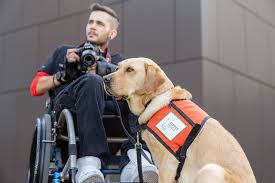The Incredible Role of Service Dogs in Enhancing Lives
Service dogs play a vital role in supporting individuals with disabilities, providing not just companionship but also essential assistance in their daily lives. These highly trained dogs are more than just pets; they are dedicated helpers and loyal partners.
Types of Service Dogs
There are various types of service dogs trained to assist individuals with different needs:
- Guide Dogs: Assist individuals with visual impairments by navigating obstacles and guiding them safely.
- Hearing Dogs: Alert individuals with hearing loss to important sounds like doorbells, alarms, or approaching vehicles.
- Service Dogs for Mobility Assistance: Help individuals with mobility challenges by retrieving items, opening doors, and providing stability while walking.
- Medical Alert Dogs: Detect changes in their handler’s body odor to alert them to impending medical issues like seizures or low blood sugar levels.
- Psychiatric Service Dogs: Provide emotional support and assistance to individuals with mental health conditions such as PTSD or anxiety disorders.
The Training Process
Service dogs undergo rigorous training to perform specific tasks that cater to their handler’s needs. Training includes obedience training, task-specific training, socialization, and public access training to ensure the dog can accompany its handler in various environments.
The Impact of Service Dogs
Service dogs have a profound impact on the lives of their handlers. They not only provide practical assistance but also offer emotional support and companionship. These remarkable animals help enhance independence, boost confidence, and improve overall quality of life for individuals with disabilities.
Conclusion
In conclusion, service dogs are much more than pets; they are essential partners that make a significant difference in the lives of people with disabilities. Their unwavering dedication, intelligence, and compassion exemplify the incredible bond between humans and animals.
Everything You Need to Know About Service Dogs: FAQs Answered
- What tasks can a service dog perform?
- How can I get a service dog for myself or a loved one?
- Are service dogs allowed in all public places?
- What is the difference between a service dog and an emotional support animal?
- How are service dogs trained and certified?
- Do service dogs require special care or accommodations?
What tasks can a service dog perform?
Service dogs are trained to perform a variety of tasks to assist individuals with disabilities. These tasks can vary depending on the type of service dog and the specific needs of their handler. Some common tasks that service dogs can perform include guiding individuals with visual impairments, alerting individuals with hearing loss to important sounds, retrieving items for individuals with mobility challenges, detecting changes in blood sugar levels for individuals with diabetes, providing emotional support for individuals with psychiatric conditions, and much more. The training and skills of service dogs enable them to enhance the independence and quality of life of their handlers in numerous ways.
How can I get a service dog for myself or a loved one?
For individuals seeking to obtain a service dog for themselves or a loved one, the process typically involves several key steps. Firstly, it is crucial to determine the specific needs and requirements that the service dog would fulfill, such as mobility assistance, medical alert support, or emotional support. Once the need is identified, individuals can research reputable organizations that specialize in training and providing service dogs. These organizations often have application processes that require detailed information about the individual’s disability or condition to assess eligibility for a service dog. Additionally, there may be associated costs and waiting periods involved in obtaining a trained service dog. It is essential to thoroughly research and communicate with service dog providers to understand the process and commitment required to welcome a service dog into one’s life effectively.
Are service dogs allowed in all public places?
Service dogs are permitted to accompany their handlers in most public places due to the Americans with Disabilities Act (ADA) regulations. These specially trained dogs are not considered pets but rather working animals that provide assistance to individuals with disabilities. Under the ADA, service dogs are allowed to enter establishments such as restaurants, stores, hospitals, and public transportation where pets may typically be restricted. However, it is important to note that there are exceptions, such as sterile environments like operating rooms or areas where the dog’s presence may pose a direct threat to others. Overall, service dogs play a crucial role in enhancing accessibility and independence for individuals with disabilities in various public settings.
What is the difference between a service dog and an emotional support animal?
When it comes to the distinction between a service dog and an emotional support animal, the key difference lies in the specific tasks they are trained to perform. A service dog is trained to assist individuals with disabilities by performing specific tasks directly related to their handler’s needs, such as guiding individuals with visual impairments or alerting those with medical conditions. On the other hand, an emotional support animal provides comfort and companionship to individuals with emotional or mental health issues but is not trained to perform specific tasks. While both play crucial roles in supporting their handlers, service dogs have specialized training for task-oriented assistance, whereas emotional support animals offer primarily emotional support and comfort.
How are service dogs trained and certified?
Service dogs undergo specialized training to perform tasks that cater to their handler’s specific needs. The training process typically involves obedience training, task-specific training, socialization, and public access training to ensure the dog can accompany its handler in various environments. While there is no official certification or registry for service dogs in the United States, reputable service dog organizations provide documentation and identification for trained service dogs. It is important to note that certification requirements may vary depending on the organization or individual trainer, but what truly matters is the dog’s ability to assist its handler effectively and reliably.
Do service dogs require special care or accommodations?
Service dogs do require special care and accommodations to ensure they can perform their duties effectively. Proper care includes regular grooming, veterinary check-ups, and a balanced diet to maintain their health and well-being. Additionally, service dogs need appropriate training and socialization to be well-behaved in various environments. Accommodations such as access to water, rest breaks, and a comfortable resting area are essential to support their physical and mental needs while on duty. It is crucial for handlers and the public to understand and respect the unique requirements of service dogs to enable them to fulfill their important roles successfully.



